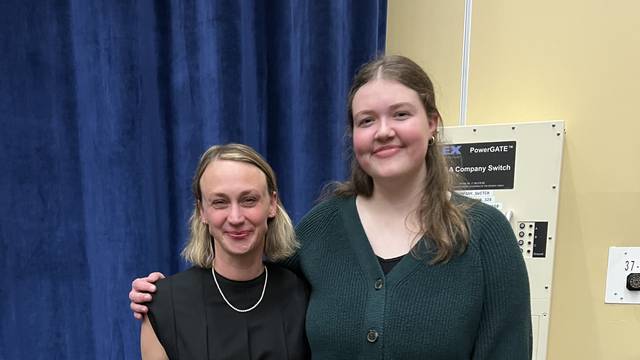Students in the honors colloquium “Music and the Marginalized” have spent the semester exploring music by, for, and about people from marginalized populations. While listening to works from a variety of genres, students have analyzed music’s role in challenging or reinforcing the status quo. Dr. Brian Allred, who also teaches flute and music theory at the University of Wisconsin-Eau Claire, brings his interest in the intersection of social issues and music to the course.
Allred received three degrees in flute performance: a Bachelor’s of Music from the Crane School of Music at SUNY Potsdam, a Master’s of Music from the Royal Birmingham Conservatoire in the United Kingdom, and a Doctorate of Musical Arts from the University of Kansas. Allred shared his optimism about his students’ experiences in his course: “It's exciting to see the class engaging with the analysis and discourse presented in the course.”
Through his honors course, Dr. Allred aims to help students get a better understanding of what gives music meaning and what makes music interesting. To do so, students explore how musical works develop our understanding of people from marginalized groups and their cultures. Allred loves “the flexibility and openness of the students. We managed some good conversations on difficult topics within the first few weeks of class.”
This course not only allows for independent exploration, but also generates lots of open conversation between classmates. Second-year studio art major Christopher Ehlert’s favorite part from his time in this course was being exposed to new music and discussing the impact it can have. Ehlert explains that “there is a lot more history behind different types of music and performing arts than I expected.” The “low-stress atmosphere combined with the important conversations surrounding marginalized communities within music” expanded Elhert’s understanding of the industry's impact on equity, diversity, and inclusion.
Will O’Brien, third-year English major and theatre arts minor, has been particularly intrigued by the class’s conversation around LGBTQIA+ representation in American musical theatre: “Typically, musical theater is seen as a microcosm of the LGBTQ community, seemingly a very welcoming space. Yet, as we have seen in class, it still continues to perpetuate harmful stereotypes and tokenisms.” O’Brien articulates his takeaway from his research into this issue: “representation is great, but only when done with purpose.” For him, learning how music impacts representation of different minority groups was a gratifying way to meld his background in English literary studies with his interest in global music.
Dr. Allred looks forward to “seeing where the students take these ideas with their own research” as the semester concludes. He hopes students will continue to explore how music and society inform each other through classical music and beyond, even after the end of the semester.



